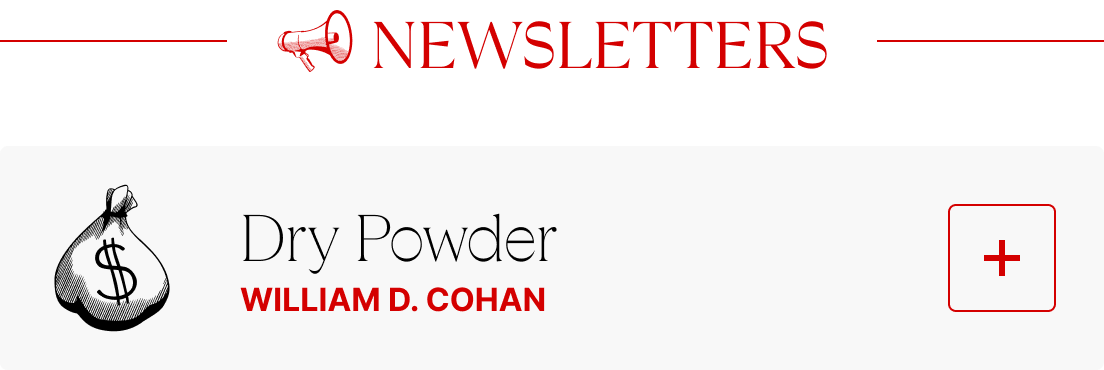Welcome back to The Best & The Brightest. I’m Peter
Hamby.
Tonight, an exclusive look inside a new series of focus groups with voters in battleground states. The listening sessions were convened in recent days by Unite the Country, the Democratic super PAC, in an effort to repair their party’s dismal reputation with voters. Reviews of the Democratic Party were absolutely brutal, but the voters also had harsh appraisals of “weird nerd”
Elon Musk and his efforts at DOGE. As for Donald Trump, voters want him to focus on fixing the concerns that got him back to the White House: inflated prices and the high cost of living.
But first, here’s Abby Livingston and Leigh Ann Caldwell…
|
|
|

|
Abby Livingston
|

|
Leigh Ann Caldwell
|
|
Prelude to the Next Fight
|
- Johnson’s
marginalia: Republicans spent the day scrambling to secure the votes to pass their much-anticipated budget resolution, which finally squeaked through this evening, marking the first step toward the party’s goal of securing major tax and spending cuts. Still, House Speaker Mike Johnson shouldn’t relax just yet. This was the easy part.
As always, Johnson’s largest obstacle was his razor-thin majority: He could afford to lose just one Republican
vote—and he lost exactly that many, with Kentucky’s Thomas Massie the only “no.” In the end, the bill passed 217-215. To deliver this outcome, the speaker had to contend with three colliding forces: contrarians like Massie, Victoria Spartz, and Freedom Caucus members who are the most recalcitrant on spending policy (they wanted bigger cuts); vulnerable Republicans still smarting from the shock of last week’s anti-DOGE protests and bruising town halls;
and Trump’s ever-present means of bending Republicans to his will by way of primary threats. (Recall that during Johnson’s speaker vote earlier this year, Trump successfully flipped two holdouts. He didn’t bother with Massie.)
But actually turning this framework—the most ambitious Republican tax and spending cuts effort since at least the Gingrich era—into reality will still require numerous rounds of legislating. The Appropriations and Ways and Means committees
are the next battlegrounds in which even more Republican infighting may emerge, specifically with regard to the SALT deduction.
But actually turning this framework—the most ambitious Republican tax and spending cuts effort since at least the Gingrich era—into reality will still require numerous rounds of legislating. The Appropriations and Ways and Means committees are the next battlegrounds in which even more Republican infighting may emerge, specifically with
regard to the SALT deduction.
After the election, Republicans scaled back their legislative ambitions to match their narrow House margin—hence the interminable debate over the “one big, beautiful bill” strategy that has divided the House and Senate. Nevertheless, it was always assumed that tax cuts—the G.O.P.’s biggest priority, and for some members the only priority—would be an easy win. The Republicans have indeed won this round, but just barely. Which raises the
question: If it’s so hard to do the easy stuff, will they actually manage the rest of it? —Abby Livingston
- Shutdown showdown: Setting aside the capacity of Republicans to pass the president’s agenda, there’s a much more immediate challenge: Funding the government beyond March 14. Predictably, perhaps, the behind-the-scenes jockeying is continuing to go sideways. Both Republican and Democratic sources say that G.O.P. appropriators have
given Democrats four spending offers. But Democrats, furious over Trump and Elon Musk taking a chainsaw to the federal government, have ignored all of them.
Senate Republicans, per two Republican sources, are considering putting forward a “clean” government funding extension at current spending levels—something Republicans aren’t thrilled about, but which would potentially force Democrats to provide the votes to keep the lights on. In other words, Republicans are betting
that shutting down the government over anger at Trump is not a winning message for Democrats. And Democrats, meanwhile, are contending that Republicans have the majority, and so it’s up to them to come up with the votes to fund the government. The fight will only intensify as the clock keeps ticking over the next two and a half weeks. —Leigh Ann Caldwell
|
|
|
New focus groups of swing state voters found reserves of goodwill for Trump—perceived as
a man of action compared to “feckless” Democrats—but deep distrust toward Musk, widely viewed as “weird,” “radical,” and “selfish.” Mostly, however, they just wanted to talk about the astounding price of eggs.
|
|
|
Ever since Elon Musk launched his slash-and-burn effort to shrink the
federal government under the auspices of DOGE and with the blessing of Donald Trump, polls have demonstrated that voters are queasy about the idea. The latest survey from our partners at Echelon Insights found that a majority of likely voters (51 percent) disapproved of Musk’s current role in the federal government. And 57 percent said Musk was wrong to dismantle government programs “when he wasn’t elected and has no expertise in government.”
But despite the abundance of public polling about the administration since Trump took office just over a month ago, we haven’t seen many focus groups, which lend useful texture that polls don’t capture. Polls, for instance, don’t tell you that Musk is a “weird nerd,” which is how Adam, a Trump-voting hockey fan from Macomb County, described the billionaire last week. Or that he’s a “complete tool,” as
Michael from Milwaukee put it, or “scary” (Tyesha in Toledo), or “selfish” (DeAndre, also from Milwaukee) and just looking to enrich himself. Perhaps Eric, a real estate appraiser from Pittsburgh, put it most poignantly: “Extremely radical. Scary. I just shudder that Trump has given him carte blanche.”
These quotes are just a sample of
what swing voters in Michigan, Wisconsin, Pennsylvania, Ohio, and Florida had to say about Musk during a series of mid-February focus groups commissioned by Unite the Country, a Democratic super PAC formed in 2020 by a group of former Joe Biden aides to support his presidential bid. (The PAC shifted its support to Kamala Harris last year.) After last year’s loss, I’ve had a running conversation with one of the group’s founders, the Florida-based strategist
Steve Schale, about how the Democratic Party’s brand has collapsed in recent years. “There is an urgent need for non-Beltway Democratic strategists to help reshape the party’s narrative and revitalize its brand beyond Washington,” said Schale, who helped engineer Barack Obama’s two Florida victories in 2008 and 2012. Over the weekend, Schale sent me the files from four focus groups commissioned by UTC and conducted by the Democratic research firm Greenberg
Quinlan Rosner.
Registered voters from the aforementioned states were divided into four buckets: non-college voters of color who didn’t vote in 2024; white suburban swing voters who broke for Harris; non-college white voters under 50 in Macomb County who voted for Biden but flipped to Trump in 2024; and white men from Macomb County who voted for Trump but who are pro-choice. “We need to understand what has
happened to voters who either once voted for us, or were open to voting for us,” Schale told me. The Macomb focus groups conducted last week, he said, were the most instructive. “Macomb County is a place that President Obama won by four points just 12 years ago, but by 2024, Trump won it by 12. Understanding what happened there is critical to clawing back a few of those voters.”
Focus groups are
hardly scientific, but they do provide valuable mood music from the states that decide the presidency and control of Congress. A few big themes emerged from all four sessions: Musk and DOGE are viewed with deep skepticism, but Trump himself is seen as a man of action, especially compared to Biden and the Democrats—a party described as “weak,” “feckless,” “too woke,” and “out of touch.” Meanwhile, almost everyone in the groups said they primarily get their news from social media, podcasts,
or local news stations. A few said they watched Fox News, but most said they didn’t pay attention to traditional news organizations—TV or digital. (Notably, several voters defined “headlines” as the titles of YouTube videos.)
Views on Trump were mixed, but voters were in agreement that he is stronger and a more effective communicator than Biden, Harris, or anyone in the Democratic Party. Many said they were giving the new
president the benefit of the doubt, as long as he could solve the problem that dominates conversations among their friends and family, the issue above all other issues: the cost of living.
|
Immigration, Ukraine, DOGE. In each focus group, the voters said they cared about
Trump’s approach to all three issues, but across all races, genders, and political persuasions, those concerns were mostly just background noise compared to the scourge of stubbornly high prices. “Money just doesn’t go as far as it used to,” said Chris, a Trump voter from Bloomfield Hills, Michigan. “A hundred dollars used to last me maybe five days. Now it doesn’t even last me half a second.”
The issue of rising costs has not gone away since last November, when it was the dominant theme of the election (at least until Harris made a final campaign push about saving democracy). Almost every focus group voter complained about the cost of housing, eggs, bacon, gas, construction materials, interest rates, you name it. Above all else, they said they want Trump to focus on their pocketbooks and stop inflation for good. “I think five years from now, if I could wake up and see a land of
opportunity again, like the America of old, and see people my age getting mortgages without dual incomes, with decreasing costs, that would be a huge improvement,” said Rob, a Latino entrepreneur from Tampa.
As for the possibility that Trump’s tariffs will drive up prices? His supporters in the Michigan focus groups had mixed opinions. “I am concerned about tariffs because we eat, sleep,
and breathe the automotive industry here,” said Athena, a remote tech worker who voted for Trump. “If they negatively impact the automotive industry, to where they lay people off or they don’t produce as many cars, this area here will be very impacted. So will every other business.” Kelly, an education worker in Macomb County, said tariffs are long overdue. “They’ve been unfavorable to us for a really long time, so I think it’s totally fair that it goes back,”
she said. “It’s not our job to take care of everybody else.”
Most of the Trump voters in Michigan were willing to wait and see whether the president’s policies would bring down costs. The Black and Latino nonvoters were skeptical that the government could do anything to make their lives easier, while the Harris voters said tariffs will make costs higher. “I’m just hoping for the least damage possible,” said Deborah, a retiree in Wisconsin who voted
for Harris.
|
A major theme coursing through all the conversations was the idea of Trump’s strength,
or at least projection of strength. Trump’s flood-the-zone strategy—executive actions by the hour, filling screens large and small with a constant barrage of news—seems to be having the desired effect. “You can see a difference between how other administrations were not doing any work, and how he is every day,” said Kelly. “He’s attending events, meeting dignitaries, welcoming them to the country. He’s taking phone calls, he’s doing executive orders. He’s still got time for his
grandkids. It’s like the light is on in the White House at five in the morning.”
Matt, another Trump voter from Macomb, echoed the point. “It proves that they had the power to do things like that and just never did.” Matt, sounding like every Trump voter ever, said he respected Trump’s willingness to take a billy club to Washington, but that he didn’t like his personal style: “He could
catch more bees with honey. He could do everything he’s doing in the exact same way he’s doing it, and just not say dickhead things all the time.”
In every focus group, participants (even the Harris voters) said Trump’s always-on visibility made for a stark contrast to Biden. “It’s cruel that they made him be president and the guy was clearly mentally declining,” said Andrew, a college professor from Columbus who voted for Harris. Asked to describe
Biden in one word, Eric, the Pittsburgh real estate appraiser who had no kind words for Musk, answered, “Weak.” He said Biden’s decision to run for a second term “was such a joke, and he was clearly not fit to be president for the next four years.” DeAndre from Milwaukee, one of the fence-sitting voters of color, was blunt in his description of Biden: “Bad. Old. Terrible.” Rob, the Latino entrepreneur from Tampa, said it was silly that Democrats pretended Biden was up for the job of a second
term, when it was plain to see that he was not. “He was doing old things like falling and appearing confused. I don’t agree with Trump, but he has the perception of strength.”
|
If Unite the Country were looking for proof that Democrats are in desperate need of a
cause, leader, brand, issue set, anything… well, they found it. The Trump voters, Harris voters, and nonvoters all failed to come up with something positive to say about the party. In the Michigan groups, the moderator asked voters to succinctly describe the Republican Party. Words and phrases that came up: “patriotic,” “strong,” “building,” “united.” Asked to play word association about the Democrats, the voters offered “weak,” “out of touch,” and “woke.”
Yes, most of the Michigan
participants voted for Trump, but those same voters said they’d voted for Democratic candidates in the past, and almost all said they fondly remembered when Democrats put the focus squarely on working people rather than the urbane preoccupations of college-educated voters. “The Democrats aren’t the Democrats they used to be,” said Chris from Bloomfield Hills. David, a father from Southfield, said he liked Democrats better when Barack Obama was running. “The Democrats used to be
about helping the middle class, healthcare, trying to get an affordable wage. They shifted far left. They kind of forgot about their base to get these extreme groups, like all these D.E.I. people. The middle class, helping the unions, that used to be their bread and butter. They moved away from that and that’s why they lost elections.”
Every group was shown a handful of Kamala Harris advertisements from
the campaign—each focused on pocketbook issues—but almost no one remembered seeing them. One nonvoter, Victor, who works at a sushi restaurant in Pittsburgh, recalled seeing the Trump ad showing Harris on The View, unable to articulate whether she would do anything differently than Biden: “The funniest one was when somebody asked her what she would fix from Joe Biden, and she didn’t even know the answer!” Many did recall seeing the infamous—and effective—Trump
ads that showed Harris supporting taxpayer-funded transgender surgeries for prison inmates. Eric from Pittsburgh ultimately voted for Harris, but he never forgot the ad. “I know that she came from San Francisco or whatever, but that was just too woke for me.” DeAndre, from Milwaukee, said he wished the Democrats could turn back the clock. “Low prices, low crime, no sex changes,” he said.
Harris was
talked about fondly by some voters, but even among the group of people who voted for her, several said they wished there had been a primary. Most said they voted for her only because they didn’t want Trump back in office. “In my mind, Kamala didn’t have any policies, any plans,” said Matthew from Moon Township, Pennsylvania. “It was just all about, ‘Stay tuned, we’re going to fix this.’ But she never really said what she was going to do.”
A handful of
Harris voters and nonvoters said the country just isn’t ready to elect a woman as president. Alyssa, a full-time student in Millersville, Pennsylvania, said that her Democratic friends wished they had another choice on the ballot. “Democrats were upset that Joe Biden just picked Kamala. And I think a lot of people were upset about that. They were like, We don’t have a voice. And also, just to put it bluntly, I think a lot of people didn’t want to vote for a woman.
They’d rather not vote at all than vote for a woman who’s a person of color.”
|
|
|
Join Emmy Award-winning journalist Peter Hamby, along with the team of expert journalists at Puck, as they let you in on the
conversations insiders are having across the four corners of power in America: Wall Street, Washington, Silicon Valley, and Hollywood. Presented in partnership with Audacy, new episodes publish daily, Monday through Friday.
|
|
|
Unique and privileged insight into the private conversations taking place inside boardrooms and corner offices up and down
Wall Street, relayed by best-selling author, journalist, and former M&A senior banker William D. Cohan.
|
|
|
Need help? Review our FAQ page or contact us for assistance. For brand partnerships, email ads@puck.news.
You received this email because you signed up to receive emails from Puck, or as part of your Puck account associated with . To stop receiving this newsletter and/or manage all your email preferences,
click here.
|
Puck is published by Heat Media LLC. 107 Greenwich St, New York, NY 10006
|
|
|
|


















